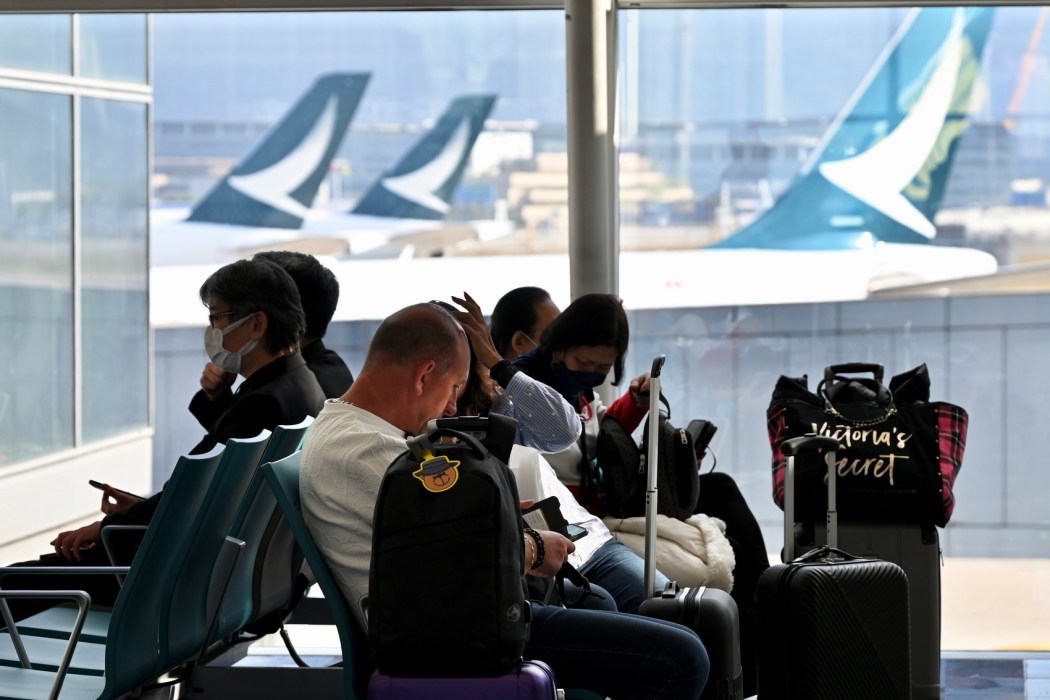A Japanese journalist known for his coverage of Hong Kong’s protests was barred from entering the city days before the 26th anniversary of its Handover to China, according to various Japanese news outlets.
It was believed to be the first time a reporter from Japan had been denied entry to Hong Kong, after a Japanese photographer and a street singer said they had been barred from the city.

Yoshiaki Ogawa, the author of the book Chronicles of Hong Kong’s Protests, arrived at Hong Kong International Airport last Thursday.
The 54-year-old freelance journalist was taken to a room and interviewed by immigration officers for around an hour, before being requested to sign a document acknowledging the refusal of his entry into Hong Kong, according to The Japan Times and The Asahi Shimbun.
Ogawa said he was not given a clear reason for denying his entry, but was only told that he could not be granted permission to stay, according to the same reports. The reporter returned to Tokyo on Friday afternoon.
“I’ve worked to convey things about Hong Kong to Japan, but it was not like I was going to do any [suspicious] activities in the city,” Ogawa told the press shortly after arriving at Tokyo’s Narita Airport, according to The Japan Times.
The reporter also told the media that he thought his work was “unwelcomed” by the Hong Kong government, adding that “Hong Kong has changed” as incidents like this would have been unthinkable before.
In its reply to HKFP, the Immigration Department said it would not comment on individual cases, adding that it acts in accordance with the laws and policies in handling each immigration case.

Ogawa has been writing about Hong Kong’s politics since he covered the Umbrella Movement in 2014. He contributed to Forbes Japan, and wrote two books on Hong Kong, including Eyewitness Accounts: The Terrifying Truth of Hong Kong’s Suppression.
Sam Yip, former district councillor and spokesperson of the Japan Hong Kong Democracy Alliance, said in a statement posted to Facebook that this was the first case of a Japanese journalist being denied entry to Hong Kong, adding that it was evident that the rejection was due to his past coverage and publications.
“The refusal of entry to journalists on the 3rd anniversary of the implementation of the National Security Law is a symbol that demonstrates the complete disappearance of press freedom in Hong Kong and the freedom of anyone to enter or exit Hong Kong due to the implementation of the National Security Law,” Yip said.
He urged Tokyo to safeguard the freedom of entry and exit for Japanese people.

In June 2020, Beijing inserted national security legislation directly into Hong Kong’s mini-constitution – bypassing the local legislature – following a year of pro-democracy protests and unrest. It criminalised subversion, secession, collusion with foreign forces and terrorist acts, which were broadly defined to include disruption to transport and other infrastructure. The move gave police sweeping new powers, alarming democrats, civil society groups and trade partners, as such laws have been used broadly to silence and punish dissidents in China. However, the authorities say it has restored stability and peace to the city.
Photographer, performer barred
In December 2022, Japanese freelance photographer Michiko Kiseki was denied entry into Hong Kong, with immigration officials grilling her on an exhibition in Japan of her shots of the 2019 Hong Kong pro-democracy protests and unrest, Kiseki said on Twitter.
いつかこの時が来るとわかっていたので。ただ、思ったより早かった…しかし、2019年の写真を発表し続けたことに1ミリの後悔もありません。それが「私の証」だから。 ただ、驚いたのは別室での質問の中で写真集ではなく日本での写真展に関して何度か言及されたことです。
— キセキミチコ/Michiko Kiseki (@kisekimichiko) January 5, 2023
A Japanese street performer named Mr. Wally also claimed he had been denied entry into Hong Kong on June 12 – the 4th anniversary of the beginning of the 2019 protests and unrest – after being taken into a separate room at the airport.
He said on Facebook that he was interviewed for over two hours by immigration officers, who told him that he was barred from entering the city due to his history of busking on the street while on a working holiday visa.
The performer said he had asked the police and the Immigration Department before whether it was legal to perform on the street, yet it was the first time he was told that busking was not allowed.
Calling this an unreasonable excuse, Mr. Wally said he thought the refusal of entry was because he had displayed a sign that read “Hongkongers Add Oil” – a phrase of encouragement that loosely translates as “come on” – during the 2019 protests.
“Hong Kong has completely changed, and could no longer tolerate a single string of freedom of expression,” Mr. Wally wrote on his Facebook.
Support HKFP | Policies & Ethics | Error/typo? | Contact Us | Newsletter | Transparency & Annual Report | Apps
Help safeguard press freedom & keep HKFP free for all readers by supporting our team
























